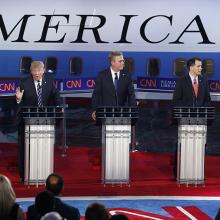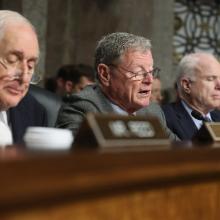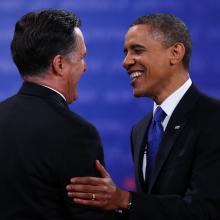debate

Former New Jersey Gov. Chris Christie, former U.S. Vice President Mike Pence, and Florida Gov. Ron DeSantis hold their hands over their hearts for the U.S. Pledge of Allegiance at the start of at the first Republican candidates' debate of the 2024 U.S. presidential campaign on August 23, 2023. REUTERS/Jonathan Ernst
While there are some extreme politicians like Rep. Marjorie Taylor Greene (R-Ga.) who proudly claim the label, it’s unlikely the top Republican presidential candidates will explicitly embrace Christian nationalism by that name. Instead, voters in the 2024 election will need to be on the lookout for how candidates’ behavior and rhetoric aligns with Christian nationalist ideals and anti-democratic beliefs. Or as Jesus put it: “You will know them by their fruits” (Matthew 7:16).
In New York City’s Upper East Side, just down the road from the Met Gala’s red-carpet celebrities and flashbulbs, around 400 high school students, teachers, alumni, parents, and formerly incarcerated people came to Regis High School’s auditorium on Monday night to listen to two high school debate students compete against two alumni of the Rikers Debate Project.
Last night’s vice presidential debate left viewers with many questions: Would Mike Pence aid in a peaceful transition of power should Donald Trump lose the election? Why do Kamala Harris and Joe Biden like fracking so much? Why was Susan Page denied a mute button? And why was that fly so drawn to Pence, plexiglass be damned? Perhaps it was the vice president’s hairspray, or his chilling stillness, or his pinkish eye. We may never know for sure. But in my search for answers, I turned to the Bible.
For the first time in three general election debates, a moderator asked the presidential candidates on Oct. 19 about abortion.
Given that abortion has rightly been described as the source of America’s second civil war, there has been a baffling lack of engagement with it this election cycle.

Image via Ezume Images/Shutterstock.com
Now, more than ever, we need political candidates and elected officials on both sides of the aisle who value the rich and diverse tapestry of this nation and seek to build bridges instead of walls. And while we deserve candidates who exhibit civility and respect in their campaigns and governance, this has never been a guaranteed right. We must be committed and courageous enough to speak out for mutual respect and decency. We must challenge all leaders and hold them accountable to the values presented throughout the gospel.
Grist’s Emma Merchant recently crunched the numbers on how frequently climate change has been discussed in the debates of the past five presidential election cycles (2000, 2004, 2008, 2012, and 2016).
She found that, out of 1,500 minutes of presidential and vice-presidential debate, climate change got a paltry 37 minutes of discussion. In 2012, of course, climate change got a whopping zero minutes of debate time.

Image via Lucy Nicholson / REUTERS / RNS
Oct. 28 is the third debate for the Republicans, and since their last stage appearance, several have been ringing the religious liberty bell from one primary state to the next.
CNBC, which is hosting this debate, says the focus will be on economic issues when the mikes turn on at Coors Events Center at the University of Colorado in Boulder.
But that doesn’t mean God talk will be muted. Didn’t Pope Francis just sweep through, telling U.S. leaders about the moral dimensions of public policy?
Like other citizens of our free land, Christians tend to divide sharply, predictably, and with heated language.
We disagree about almost everything, from cultural norms to attitudes toward wealth and power; from personal behavior to what Jesus intended.
To judge by our blog posts, our comments, our letters to the editor, and our remarks in public, we are appalled at what other Christians believe. How can this person have that viewpoint and still call himself a Christian? Does she not know that her words heap burning coals on her own head?
In view of our fiery words, you’d think we had explored the extremes of Christian faith and were shouting across a vast, unbridgeable chasm. In fact, we differ within a narrow spectrum, like those who debate Coke vs. Pepsi.
That narrow spectrum tends to be far removed from what Jesus actually said, did and expected. We argue about things that don’t matter because we can’t stand the things that do matter. We argue about sex, for example, in order to avoid the topic Jesus actually addressed, namely, wealth and power.
And when we do address wealth and power, we tend to affirm the individual’s right to have as much as they can get, even though Jesus said no such thing.
Whenever I hear about someone else making a case for Young Earth Creationism in the name of Christianity, I’m embarrassed, once again, to associate myself with them. And people wonder why many of us prefer to identify as “Jesus followers” or “Spiritual but not Religious” rather than be lumped in with the Ken Hams of the world.
Duh.
The thing is, a healthy number of us who consider ourselves to be Christian embrace science. We think critically. We accept the likelihood that much we think we understand about the world, the universe, and about our faith can (and should) change as we learn new things. We understand that faith is more about questions than answers, and that the prime mover in our faith practice is to be more like Jesus in our own daily walk, rather than focusing so much on making others more like us.
The desire of a vocal minority (yes, that’s what I said, and I meant it) of Christians to cling to a notion that the entire universe is a few thousand years old, despite the clear physical evidence to the contrary, points less to a reasonable alternate view of the observable world. Rather, it points to a desperate attempt to maintain a dying voice in the cultural conversation.

Promotion photo for the debate between Bill Nye and Ken Ham. Photo courtesy of http://www.answersingenesis.org/ Via RNS.
Bill Nye may be “The Science Guy,” but Ken Ham is the “Answers in Genesis” man, and a debate between the two over the origins of life has nonbelievers and Christians wringing their hands.
Nye, host of a beloved television science series, and Ham, president of a creationist apologetics ministry, will meet at the Creation Museum, where Ham is also the president, on Feb. 4. In what some wags are calling “the Ham-on-Nye debate,” they will weigh this question: “Is creation a viable model of origins?”
In truth, both sides answered that question long ago — Nye with Charles Darwin’s work on the origin of species and Ham with the first book of the Bible. Yet many observers — both religious and nonreligious — say the debate is a very bad idea.
FOR SEVERAL years now, a debate has raged over the issue of “net neutrality,” pitting media reformers, digital libertarians, and “content” companies such as Amazon and Netflix against old-school telecommunication giants such as AT&T and Comcast, with the Federal Communications Commission serving as an erratic referee.
Sometime early this year, the U.S. Court of Appeals for the District of Columbia may settle the question when it decides the case of Verizon vs. the FCC. If the court decides in favor of Verizon, big telecom companies will have won the right to decide what digital content we can receive, especially when it comes to video and other bandwidth-intense media.
Simply put, the issue in the Verizon case is whether broadband internet will follow the “common carrier” precedent applied to telephone lines and the electricity grid or the model of cable TV. The common carrier principle guarantees equal access to necessary public utilities. Applied to the internet, this has meant that service providers simply supply the fiber-optic cable or wireless spectrum, give equal access to all content providers, and charge the final recipient of the data (you and me) a fee that covers the cost of maintaining an adequate network.
In the cable TV business model, the provider controls the network of fiber optic cable and the content that goes over it. The cable company decides which channels are included in the basic package, which (like HBO) are purchased separately, and which will be unavailable at any price. If you want Al Jazeera instead of Fox News, too bad—it’s a take it or leave it package.
THE CHURCH IS locked in a polarized debate around same-sex relationships that is creating painful divisions, subverting the church's missional intent, and damaging the credibility of its witness. We've all heard the sound-bite arguments. For some, condoning or blessing same-sex relationships betrays the clear teaching of the Bible, and represents a capitulation to the self-gratifying, permissive sexual ethic of a secularized culture. For others, affirming same-sex relationships flows from the command to love our neighbor, embodies the love of Jesus, and honors the spiritual integrity and experience of gay and lesbian brothers and sisters.
The way the debate presently is framed makes productive dialogue difficult. People talk past one another. Biblical texts collide with the testimony of human experience. The stakes of the debate become elevated from a difference around ethical discernment to the preservation of the gospel's integrity—for both sides. Lines get drawn in the ecclesiastical sand. Some decide that to be "pure" they must separate themselves spiritually from others and break the fellowship of Christ's body. Then the debate devolves into public wrangling over judicial proceedings, constitutional interpretations, and property ownership. Meanwhile, the "nones," those who are walking away from any active relig-ious faith, find further confirmation for their growing estrangement.
Mirroring the dynamics of contemporary secular politics, the debate is driven by small but vocal minorities with uncompromising positions at one end or another of the spectrum. For the majority in the middle, who may be unclear about their own understandings, exploring their questions is made difficult because of the polarized toxicity of the debate. Further, those in positions of leadership in congregations or denominations come to regard the controversy over same-sex relationships as the "third rail" of church politics. They don't want to touch it. I know this because I've been there myself.
It was the biggest story inside the Beltway. Since last Thursday’s hearing, the whole Washington media machine has been discussing and dissecting the extraordinary confrontation in the Senate Armed Service Committee regarding the potential confirmation of former Sen. Chuck Hagel as the new Secretary of Defense. Several Republican senators were extremely combative with the combat veteran who earned two Purple Hearts for his wounds in Vietnam. Hagel deserves another Purple Heart for the wounds his former “friends” and party members tried to inflict upon him. Hagel didn’t really defend his views — which were both caricatured and attacked by his adversaries — perhaps on White House advice not risk further debates before being confirmed.
But I think Hagel’s views and the important questions he has raised about current U.S. wars and military policy deserve defending and, indeed, should become the subjects of a national debate. So I wrote a piece about one of Hagel’s most hostile questioners who insisted the possible new Secretary answer the simple question of whether the surge in Iraq was “right” or “wrong.” I said it was wrong, as was the war in Iraq, as was the war in Vietnam, as are the views of John McCain on war throughout his entire political career; and how the nation has been wounded by McCain’s and others’ “theology of war.”
Chuck Hagel’s views could lead us to a necessary national debate if he becomes the new leader of the Pentagon. And it is that potential debate that Hagel’s critics are so afraid to have.
Generally, we only know how history will be remembered once it is in the rearview mirror. Something, or some things, jump out and remain indelible in the collective memories of the culture. And in a world defined by sound bytes, sometimes only a few words tell us a lot about that moment in time.
In that spirit, here are my selections for the ten most defining phrases that will stay with us from the past year.
Thanks to Melanne Verveer’s article in Foreign Policy magazine, I’m going to be listening for what the presidential candidates say tonight about women in this foreign policy focused debate. Verveer has served since 2009 as the United States ambassador at large for global women’s issues. She is the first to ever serve in this particular position.
Ambassador Verveer is a leading expert in mobilizing support for women’s rights globally, and as a woman of faith, I am paying attention. I believe that women’s rights are human rights and that the advancement and empowerment of women is a central strategy for economic growth and promoting peace and stability around the world. Praise the Lord that this logic is now increasingly understood by government officials and international development organizations and pragmatic good sense. More importantly, as a Christian I believe that Jesus’ liberating word declares that men and women are equal in the eyes of God.
Actions, however, are lagging behind what is now becoming more mainstream thinking.
Editor's Note: Theologian extraordinnaire Tripp Hudgins put together this edition of First Thoughts prior to the first presidential debate. Still applicable before this evening's Vice Presidential debate.
Why, exactly, does it matter if President Barack Obama gave a lackluster performance in the recent presidential debate?
These quadrennial campaign sideshows have nothing to do with one's capability, preparation, aptitude or suitability for the presidency.
Why does Gov. Mitt Romney's spirited performance matter? What does a “victory” by one candidate mean, other than momentary bragging rights?
Surely we know that these debates are about as meaningful as an Oscar winner's thank-you speech. What we want from a president is a steady hand in dealing with a wicked and wayward world, a collaborative spirit in bringing a broad reach to government, and a magnanimous spirit in consoling war widows, helping victims of disaster, protecting the weak from the relentless predations of the strong, and trying to preserve an “American Dream” to which all, not just a few, are invited. We want signs of character, not a telegenic mien.
Presidential debates are like first visits to possible in-laws. You hope not to belch at supper — and then you return to the world where you are actually exploring marriage and building a life.
OK, the @firedbigbird tweets have been hilarious.
And it's almost understandable that America has given so much attention to the Big Bird comments from Tuesday's debate. (@Firedbigbird had more than 31,000 Twitter followers as of late Friday afternoon.)
I mean, Romney's comment was definitely a "zinger."
We get it. It's funny. But come on.
On Thursday, Public Broadcasting System (PBS) CEO Paula Kerger talked to CNN about the issue, and she couldn't believe the iconic children's TV star has gotten this much attention either.
Editor's Note: Tweet @newshour to ask the candidates to #TalkPoverty in Wednesday's debate.
Marianne Williamson, a bestselling author and convener of the upcoming Sister Giant conference on women and politics, has called on President Obama and former Governor Mitt Romney to address “a meaningful array of topics” – including poverty, money in politics and incarceration rates in the U.S. – tonight during the first presidential debate.
Williamson talked to us earlier today about these issues, which are particularly pressing for Christians who take Matthew 25 seriously.
The interview was edited for length and content.
Q: What are you doing to get these issues out there?
A: Having a voice and creating your own platform is not all that difficult with today’s technology. I think what’s happening now is that, firstly, people are realizing that. Secondly, people are realizing that there are certain things that need to be said that simply are not being said as loudly as other things being said. When it comes to a politics of conscience, why wouldn’t we expect that during the debates there would be a conversation about the 23.1 percent of America’s children living in poverty, or the 34 percent of poor children, or the 46 million Americans living in poverty?
I was invited to appear on a Detroit radio show this past week called Christ and the City, hosted by Christopher Brooks. It’s a right-leaning talk show with an evangelical focus, but I was energized and encouraged by the conversation because it was respectful and substantive. We didn’t see eye to eye on much (as you’ll hear), but we made space for the differences, trusting that listeners would reflect on the broadened perspective, with the hope of being enriched in the process.
The premise of the interview was a discussion of my book, Banned Questions About the Bible, but you’ll soon realize as you listen that we got into all sorts of other interesting topics, such as salvation, interpretation of scripture and the difference between “Truth” and “Fact” in the Bible.













